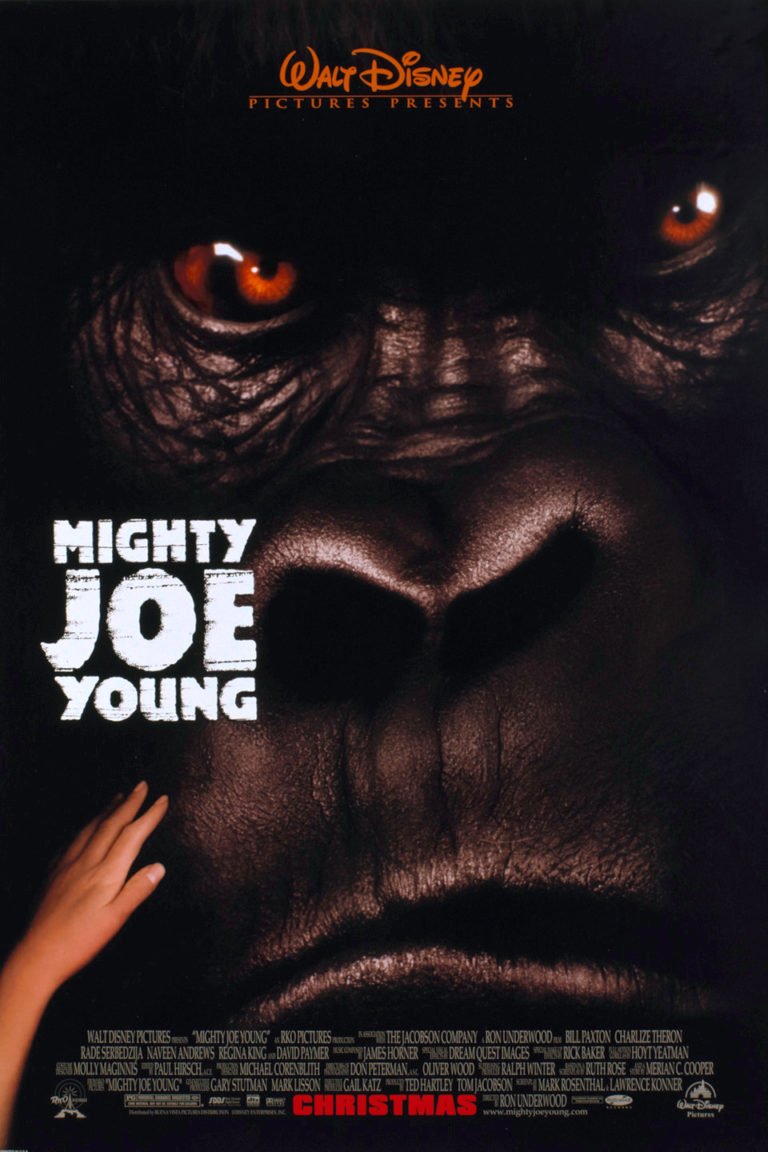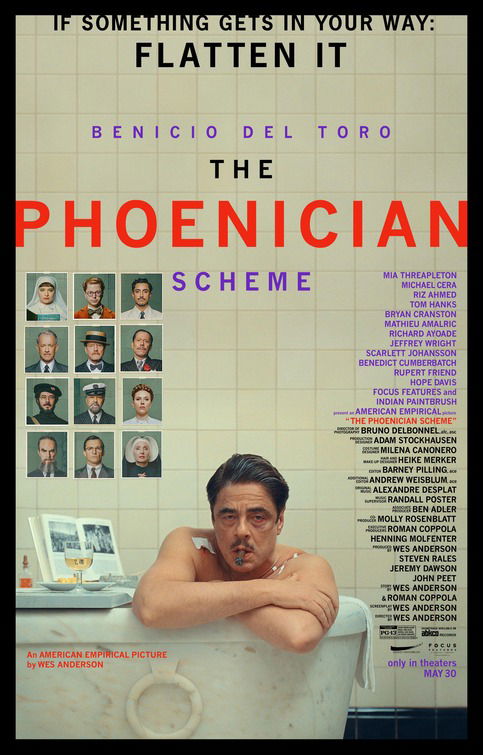“Finding Purpose in Family”

| None | Light | Moderate | Heavy | |
|---|---|---|---|---|
| Language | ||||
| Violence | ||||
| Sex | ||||
| Nudity |
What You Need To Know:
THE PHOENICIAN SCHEME is meticulously written and staged by Writer/Director Wes Anderson. As usual, his new movie is a convoluted satire full of deadpan comedy. Even the actors’ lines are delivered in a deadpan style. However, the growing positive relationship between the rich father and his daughter is the movie’s strength. As a result, THE PHOENICIAN SCHEME has a light pro-family moral worldview. Also, the movie ends with a subtle endorsement of owning a small family business. That said, PHOENICIAN SCHEME has three strong profanities and some light and strong violent content. Extreme caution is advised.
Content:
Light but undeveloped and quirky moral pro-family worldview with some positive Christian content and references, taking place in a satirical world filmed in a meticulous manner full of deadpan comedy, revolving around the story of a wealthy businessman and his daughter, where the estranged father and daughter reconnect, reconcile and thereby establish a closer relationship, plus the ending endorses owning a small business in a quirky way, and God makes two appearances in a man’s near-death experience where God is depicted like God in the famous Sistine Chapel painting where he appears as an old man with a gray beard touching the finger of Adam and not like Jesus, who is “the image of the invisible God,” according to Colossians 1:15;
One or two light obscenities, one strong profanity citing Jesus Christ and two GD profanities;
Strong and light violence includes a man sitting up front in an airplane is suddenly whisked out of the plane when a small explosion pokes a hole in the right side of the plane next to him, the plane crash lands in a cornfield down below and man survives but with a large black eye and streaks of blood down his forehead, two men have a fight to the death with swords and punches, rebels invade a fancy hotel and keep firing machine guns into the ceiling (the hotel manager comically complains about them damaging his ceiling), man comically finds a bundle of dynamite sticks on a plane, another plane crash occurs, woman who’s on the verge of becoming a nun keeps pulling a knife whenever she and her father are threatened, a large model of an elaborate infrastructure project is blown up;
No sex;
Upper male nudity in two or three shots of a man, recovering from a plane crash, sitting in an old-fashioned tub while nurses come in and out of the large bath area;
Some alcohol use;
Frequent tobacco smoking, including the daughter in the story is on the verge of becoming a nun but she frequently smokes a small pipe, but no drugs; and,
Lead male character has a near-death experience where he visits the gates of Heaven at least three times and the second time God is central, but in the third one God is just one of multiple beings, and a minor issue occurs in the story where the daughter’s Mother Superior tells the daughter that she’s a little too attached to material things to become a nun.
More Detail:
Benicio del Toro stars as the wealthy businessman, Zsa-zsa Korda. The movie opens with Korda surviving his sixth plane crash. As the plane starts to crash, Korda fires the pilot and pushes a button to eject him out of the plane. He’s made many enemies, who even send assassins to kill him.
After the plane crash, Korda calls for his estranged daughter, Liesl, to meet him. Although he has nine boys from his other two marriages, some or many of them adopted, he’s decided to name Liesl his heir. Because of her faith and sense of moral duty as a nun in training, Liesl doesn’t really want to be Korda’s heir. She also thinks her father may have killed her mother. However, Korda assures her didn’t kill her mother. He convinces her to accept the role as his heir on a temporary basis, and to travel with him to see for herself just what his business ventures are really like. Traveling with them is a Swedish insect expert, Bjorn (insects are a big hobby for Korda).
So, Liesl follows her father as he tries to close a big deal for a special project that would build a large dam, a railroad and a canal in the fictional country of Minor Greater Independent Phoenicia. Korda promises Liesl that the project is a righteous one. No more slave labor, he promises her. The project has hit a huge snag, however. An international cabal of bankers and corporate leaders oppose the project. Their machinations have led to a big gap in funding. So, Korda is traveling around Europe trying to line up another financier or two to close the gap.
Meanwhile, more assassins keep trying to kill Korda and, now, Liesl. Korda’s brother, Uncle Nubar, also is trying to stop Korda from completing the project.
Will Korda find another investor? Will Korda and Liesl survive?
As usual, Writer/Director Wes Anderson designs THE PHOENICIAN SCHEME in a meticulous way, with elaborate set designs and detailed visual compositions. For example, there are at least two brief scenes, shot from a bird’s eye view, where an injured Korda is reading a newspaper and sitting in an old-fashioned tub in a larger room on the left side of the frame while several nurses in white uniforms come in and out fussing with things in the room. The room has a record player in the upper right corner, a bidet with a toilet on the upper right side, a large sink on the right edge of the frame across from the tub, and two smaller sinks on the bottom edge of the frame. After the plane crashes in the beginning, the camera cuts to the cornfield. The camera moves past a crow perched on a diplomatic pouch in the foreground, past parts of the wrecked plane in the background and foreground, and to Korda lying face down. The camera cuts again, and Korda rises into the frame, in close-up. He has a large contusion around his left eye, some blood streaming down his forehead and a blank expression on his face as he spits out a tooth. Readers can see more examples of such visual compositions in the movie’s main trailer.
Matching these meticulously-designed scenes and tableaus are the deadpan delivery of many of the characters’ lines. The actors often have blank expressions on their faces as well. All this works together to produce a light deadpan comedy. Of course, occasionally, someone gets emotionally involved. For example, a hotel manager gets angry about a group of revolutionaries shooting up his hotel for no reason. “Why are you shooting up my ceiling?” he asks angrily. “This is a robbery,” the leader says matter-of-factly.” “I understand that,” the angry manager replies. “I’m asking about my ceiling!”
The combination of all these things creates a quirky tone of deadpan comedy. Some viewers will like this tone more than others, but it’s undeniably funny from time to time.
What’s interesting is that, as the story builds, it becomes clear that Korda and his daughter, Liesl, are growing closer together. Liesl clearly gets wrapped up in her father’s schemes and attempts to defend him. It leads to a surprising and unexpected, but touching, ending.
Consequently, THE PHOENICIAN SCHEME has a light moral worldview where the father and daughter reconnect, reconcile and begin a new life together. Ultimately, they find their purpose in family. The movie also has some positive Christian content and references. For example, the daughter has almost finished her training in becoming a nun and holds a beautiful rosary cross in one scene. Also, her Mother Superior is depicted in a positive manner, even though, in the end, she decides that Liesl has become a little too materialistic to join the nunnery.
THE PHOENICIAN SCHEME also has three brief scenes where Korda visits the gates of Heaven in three near-death experiences, from two plane crashes and an assassination attempt. He appears to be having difficulty in entering Heaven because of his sinful life. God appears as a central character in the second scene. He’s depicted with a gray beard and gray hair, like the image of God in the famous Sistine Chapel painting of God creating Adam. Is this supposed to be God the Father? God also appears in the third scene, but He’s not central. So, the scenes are ultimately rather ambiguous. Also, theologically speaking, Jesus is “the image of the invisible God,” according to Colossians 1:15, not God the Father.
THE PHOENICIAN SCHEME ends with a subtle endorsement of owning a small family business rather than a large corporation. So, the movie has a positive pro-capitalist ending.
However, the movie also has scenes with strong and light violence. Some of the violence is comical. For example, Korda travels with a box of hand grenades and, every time he meets with a potential new investor, he asks them, “Would you like a hand grenade?” One person replies, “No thanks, I have my own.” In addition, THE PHOENICIAN SCHEME has three strong profanities and a light obscenity or two.
So, MOVIEGUIDE® advises strong or extreme caution. THE PHOENICIAN SCHEME seems more family friendly than other Wes Anderson movies, but it’s still designed for mature audiences.


 - Content:
- Content: 

